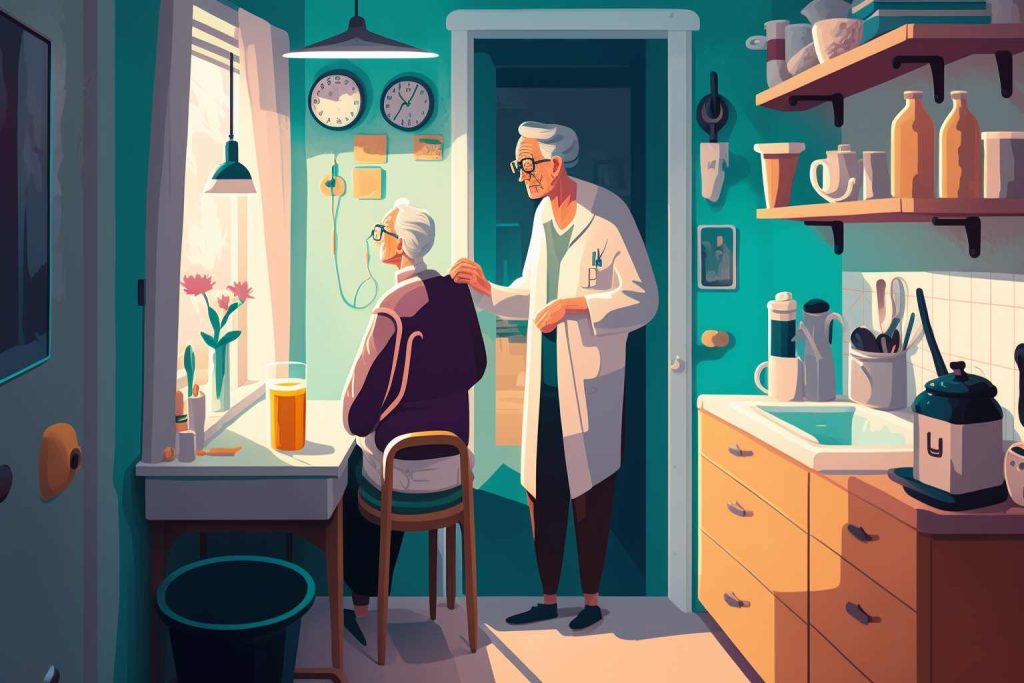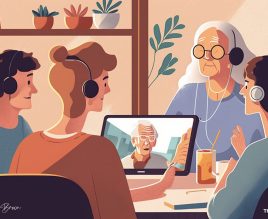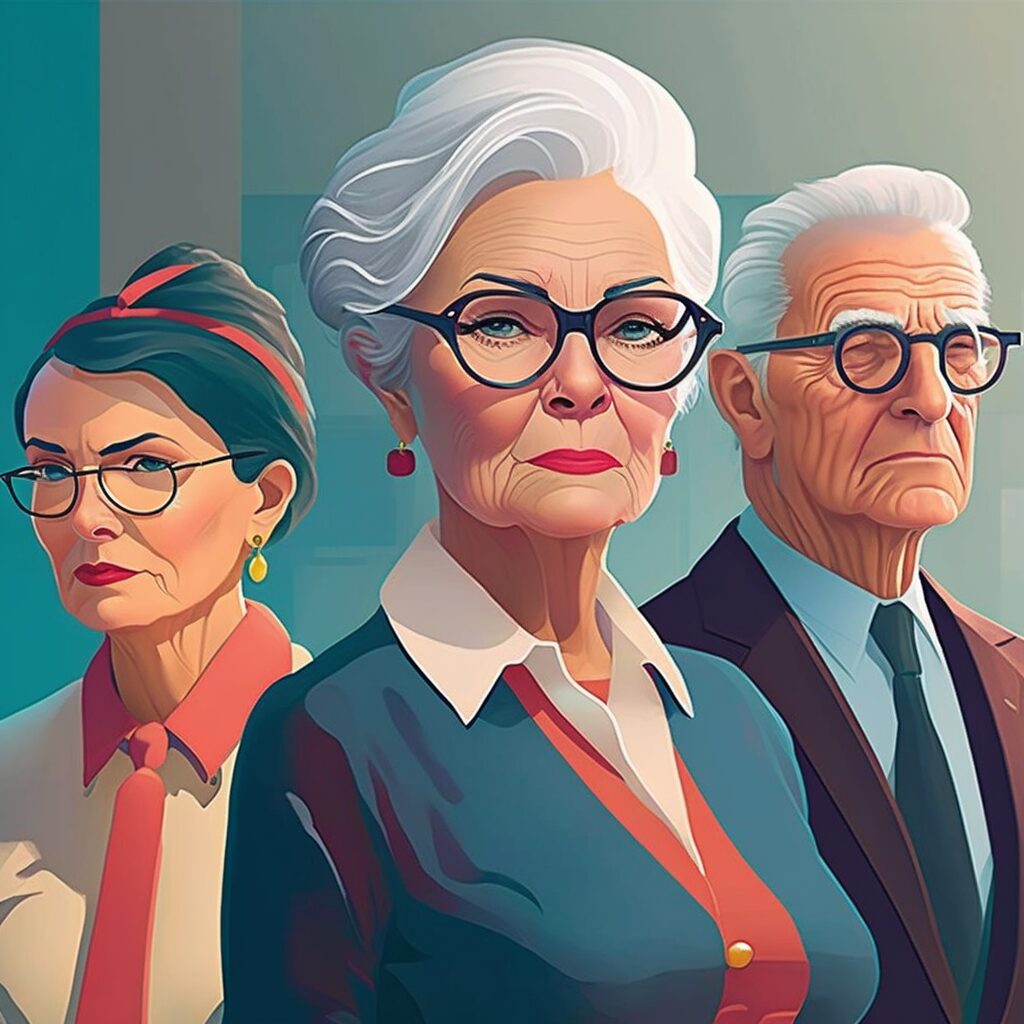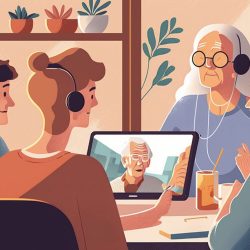Table of Contents
ToggleDigital transformation is no longer a buzzword – it’s a reality, dramatically impacting all facets of life, including healthcare. Its influence is even more significant when considering the senior population, who often face more health challenges. What if the power of technology could be harnessed to augment seniors’ healthcare experiences? This is exactly where digital transformation steps in, acting as a potential game-changer.
The introduction of remote care, virtual healthcare, and electronic medical records isn’t just a step forward; it’s a leap. It’s an integration of cutting-edge technology into the healthcare landscape, specifically tailored to seniors’ needs. Not only is it transforming how healthcare is delivered, but it is also redefining the dynamics of patient-doctor interactions and patient self-management. Here’s an exploration into this promising terrain of healthcare innovation.
The Rise of Remote Care
With the rapid advancement in technology, remote care is soaring high in the healthcare sector, proving to be a beacon of hope for older adults. Imagine a healthcare system where seniors receive medical attention right in their comfort zone, thereby bypassing geographical constraints and limitations. That’s remote care for you – the epitome of convenience and efficiency. This part delves into how remote care solutions are revolutionizing healthcare for seniors.

Digital Transformation in Senior Healthcare: Thriving Solutions
Remote care solutions are not only a novel concept; they’re a necessity, especially for older adults. These solutions integrate digital technology into healthcare services, making them more accessible and manageable for seniors. Covering aspects such as telemedicine services, home monitoring systems, and remote patient consultations, they’re redefining the healthcare narrative for seniors. Read on to get a deeper insight into these breakthrough solutions.
1. Telemedicine Services
Telemedicine services have been a silver lining amidst recent events, enabling seniors to access healthcare services without stepping outside their homes. Think of it as a virtual clinic where you can consult with your doctor over a video call. It’s a perfect blend of convenience and medical expertise, making healthcare more accessible and immediate for older adults.
2. Home Monitoring Systems
Home monitoring systems, the digital eyes, and ears in a senior’s home, have been a game-changer. These systems keep track of health metrics and vital signs, alerting healthcare providers if something seems off. What if a medical emergency could be averted before it even happens? That’s the power of these smart systems, ensuring enhanced safety and improved quality of life for seniors.
3. Remote Patient Consultations
Imagine a healthcare scenario where doctor-patient interactions aren’t limited to the confines of a physical clinic. That’s what remote patient consultations promise – a healthcare model that is more accessible, personalized, and efficient. These consultations are a virtual meeting ground for doctors and patients, leveraging digital platforms for medical consultations.
Seniors can discuss their health concerns, review their medical history, and get expert advice without leaving their homes. It’s like having a doctor’s office right in your living room. As a result, the strain of travel, waiting room anxiety, and risk of exposure to illnesses are significantly reduced.
Moreover, these consultations often result in more focused conversations. Doctors can review medical records beforehand and come prepared with a tailored health plan. Patients also have the comfort and time to formulate their queries and concerns more effectively.
Benefits and Challenges of Remote Care for Seniors
The advent of remote care presents both unprecedented benefits and unique challenges for seniors. On the one hand, it’s empowering them with easier access to healthcare services. On the other hand, it also poses issues related to technological adaptation and data security. To truly comprehend the potential and limitations of remote care for seniors, we need to delve into a balanced analysis of its pros and cons.

Real-life Examples and Case Studies
To better appreciate the impact of remote care on seniors’ health, it’s beneficial to look at real-life scenarios and case studies. They offer practical insights into how these solutions function in real-world settings and the difference they make in seniors’ lives. Let’s explore these compelling stories to understand how remote care is transforming the healthcare landscape for older adults.
1. Virtual Healthcare Services for Seniors
The digital era has also brought forth the concept of virtual healthcare services, a new frontier in senior care. These services, like telehealth platforms, are more than just an alternative; they are a new norm, designed to offer timely and efficient healthcare solutions to seniors. From video consultations to online prescription services, these platforms are redefining the meaning of accessibility in healthcare.
2. Telehealth Platforms
Telehealth platforms act as the medium that enables the magic of virtual healthcare. They provide an all-encompassing platform that serves as a digital healthcare hub for seniors. Imagine having the convenience of multiple healthcare services, from video consultations to online prescriptions, all in one place. That’s the promise of telehealth platforms. Let’s dive deeper into some of these offerings.
3. Video Consultations
Video consultations are at the heart of virtual healthcare, making real-time interactions between doctors and patients possible. It’s akin to a face-to-face consultation, just without the physical presence. Seniors can discuss their health issues, receive diagnosis, and get expert advice all in a video call. It’s convenient, efficient, and reduces the need for unnecessary hospital visits.
4. Online Prescription Services
Online prescription services are another blessing of virtual healthcare, allowing seniors to obtain medications without stepping out. You can have prescriptions filled online and delivered straight to your doorstep, saving you the trouble of visiting a pharmacy. It’s not just about convenience but also about ensuring continuity of care, as medications are crucial to managing many health conditions that seniors often face.
The Impact of Digital Healthcare Transformation on Senior Life
The sphere of virtual healthcare services is leaving a profound impact on seniors’ lives. Imagine a world where senior citizens, regardless of their location or physical mobility, can access professional healthcare. A world where appointments, consultations, and even prescriptions are just a few clicks away. This is the reality created by virtual healthcare services.

It’s more than just the elimination of physical boundaries; it’s about a healthcare model that prioritizes convenience, safety, and personalized care. A model that adapts to seniors’ needs rather than forcing them to adapt to the system. Virtual healthcare is enhancing their ability to manage their health, leading to improved outcomes and quality of life.
Moreover, these services are promoting an active role in their own healthcare, fostering a sense of empowerment and independence. By making healthcare more accessible and manageable, virtual healthcare services are transforming how seniors perceive and experience healthcare.
Real-life Examples and Case Studies
Understanding the transformative potential of virtual healthcare services isn’t complete without examining real-life examples and case studies. These narratives bring the effectiveness of these services to life, demonstrating the real impact they have on seniors’ health and well-being.
They provide a window into how these services are implemented, how they overcome barriers, and how they improve seniors’ health outcomes. Whether it’s a senior managing a chronic condition with telehealth or a homebound senior accessing care through video consultations, these stories highlight the real-world potential of virtual healthcare.
1. Electronic Medical Records for Senior Care
In the realm of senior care, Electronic Medical Records (EMRs) are a significant development, offering a wealth of benefits. They are the digital equivalent of paper records, storing a comprehensive history of a patient’s medical information. But what if these records could do more than just store information? What if they could enhance the delivery of healthcare?
EMRs in senior care do just that, enabling a higher level of personalized care, improved care coordination, and better patient outcomes. They’re more than just a repository of information; they’re tools that make healthcare more efficient and targeted. This piece explores the role of EMRs in senior healthcare.
2. The Role of EHR in Senior Healthcare
Electronic Health Records (EHRs), a broader concept than EMRs, are revolutionizing senior healthcare. They capture a patient’s health information from all the healthcare providers they visit, creating a holistic view of their health journey. This comprehensive data is a goldmine for healthcare providers, offering valuable insights to better care for seniors.
From centralized patient information to improved care coordination, EHRs are making healthcare more seamless, efficient, and personalized. They are a testament to how technology can be harnessed to optimize healthcare delivery, especially for seniors. Let’s dive deeper into these transformative benefits.
3. Centralized Patient Information
One of the paramount benefits of EHRs is the centralization of patient information. Think of it as a single source of truth that contains all relevant health data about a senior. This includes their medical history, treatment plans, medication records, and more. The advantage? No more sifting through disjointed records.
Having all this information at their fingertips allows healthcare providers to make more informed decisions, offer tailored treatments, and ultimately, provide better care. It also empowers seniors, giving them a clearer understanding of their health status and enhancing their ability to manage their health.
4. Improved Care Coordination
Another game-changer brought about by EHRs is improved care coordination. The ability to share health records among different healthcare providers means better communication and collaboration. Imagine a scenario where all your doctors are on the same page regarding your health status and treatment plan.
This seamless exchange of information facilitates a more holistic approach to care, which is particularly beneficial for seniors with multiple health issues. It reduces the chances of medication errors, redundant tests, and conflicting treatments. In essence, EHRs are fostering a more integrated healthcare system, promoting better outcomes for senior care.
5. Benefits of EHR for Seniors
EHRs are a true testament to the benefits of technology in healthcare, particularly for seniors. Not only do they streamline healthcare services, but they also facilitate a higher level of personalized care. But what exactly makes them so advantageous for seniors?
For starters, EHRs ensure that all health data is up-to-date, comprehensive, and instantly accessible. This facilitates more accurate diagnoses and tailored treatment plans. Moreover, they reduce the need for repetitive tests and lower the risk of medical errors, both crucial aspects for seniors with complex health situations.
EHRs also promote patient empowerment. Seniors can access their health information, making them active participants in their health journey. They can better understand their health status, monitor progress, and make informed decisions about their care. In essence, EHRs are transforming the healthcare paradigm for seniors, making it more efficient, coordinated, and personalized.
6. Real-life Examples and Case Studies
Real-life examples and case studies bring to light the profound impact of EHRs in senior care. They offer a glimpse into the transformative potential of these digital tools, providing an in-depth understanding of their practical benefits and applications.
From a senior managing multiple health conditions through a centralized health record, to a care team coordinating a patient’s treatment plan more efficiently, these stories depict how EHRs are reshaping senior healthcare. They illustrate the advantages of this digital innovation, demonstrating its potential to improve health outcomes and enhance seniors’ health experiences.
Future Developments and Implications
The digital transformation in healthcare for seniors is an ongoing journey, with future developments promising even more exciting possibilities. As technology continues to evolve, so too does its potential to further enhance healthcare services. From advancements in remote care to innovative EHR features, the future holds an array of potential improvements. Let’s delve into these prospective advancements and their implications for senior healthcare.
Technological Advancements
Technological advancements are the driving force behind the digital transformation in healthcare. As tech evolves, so does its ability to create more innovative, effective, and user-friendly healthcare solutions for seniors. From AI-powered health monitors to predictive analytics in EHRs, these advancements promise to further redefine senior healthcare. The future of senior care appears bright, as we move towards an era of healthcare that’s even more personalized, accessible, and efficient.
1. Artificial Intelligence
Artificial Intelligence (AI) holds great promise in enhancing senior care. With AI’s predictive capabilities, healthcare providers can better anticipate health risks and intervene promptly, thus improving outcomes. Moreover, AI can aid in personalizing care plans based on individual health data, leading to more targeted care. It can also streamline administrative tasks, freeing up more time for patient care. The incorporation of AI in healthcare is set to make care delivery more efficient and proactive.
2. Internet of Medical Things (IoMT)
The Internet of Medical Things (IoMT) is a connected ecosystem of medical devices and applications that communicate with healthcare IT systems. This technology is transforming senior care by allowing constant monitoring of vital signs, timely alerts for irregularities, and instant communication with healthcare providers. It means seniors can receive immediate care when needed, and it provides invaluable peace of mind for both seniors and their caregivers. IoMT is pushing the boundaries of what’s possible in remote patient monitoring and care.
Changing Healthcare Landscape
The digital transformation in healthcare for seniors is redefining the entire healthcare landscape. Traditional healthcare models are giving way to more flexible, personalized, and efficient methods of care delivery. Technology is making healthcare more patient-centric, catering to the unique needs of seniors.
The implications of this shift are wide-ranging, from improved health outcomes to better patient experiences. It also signifies a move towards a more proactive and preventive approach to healthcare. However, it’s not without its challenges. Issues around tech literacy among seniors, data security, and ethical concerns need to be addressed as we navigate this new landscape.
Ethical and Legal Considerations
The adoption of digital tools in healthcare also brings ethical and legal considerations to the forefront. How do we ensure data privacy in a world of digital health records? How do we safeguard against the misuse of sensitive health data? Moreover, there’s the question of accessibility – are these services reaching all seniors, regardless of socioeconomic status or geographical location?
These questions must be carefully considered as we continue to integrate technology into healthcare. It’s vital that these advancements are accompanied by a robust ethical and legal framework that protects seniors and promotes equitable access to digital health services.
Conclusion
The digital transformation in healthcare has ushered in a new era of senior care, one that prioritizes convenience, personalized care, and improved health outcomes. From remote care and virtual healthcare to electronic health records, technology is steadily redefining the way healthcare services are delivered to seniors.
While challenges such as tech literacy among seniors, data security, and ethical considerations remain, the potential benefits of these advancements are undeniable. As technology continues to evolve, so does its potential to further enhance senior care. With more focus on addressing the challenges and capitalizing on future developments, we are on a path toward a healthcare model that is more aligned with seniors’ needs.
The key takeaway? The future of senior healthcare lies in embracing the digital transformation while ensuring ethical, secure, and equitable adoption. It’s about harnessing the power of technology to make healthcare more accessible and efficient, thereby improving the health and well-being of seniors.
FAQ
What is the difference between remote care, virtual healthcare, and telemedicine?
Remote care generally refers to healthcare services delivered remotely, such as home monitoring systems and remote consultations. Virtual healthcare is a broader term that encompasses all healthcare services delivered digitally, which includes remote care. Telemedicine is a component of virtual healthcare that specifically involves the use of technology to provide clinical services remotely.
How do electronic medical records benefit seniors and their healthcare providers?
Electronic medical records (EMRs) offer numerous benefits for seniors and their healthcare providers. They provide a centralized repository of patient information, enabling more informed decisions and personalized care. They also facilitate better care coordination among different healthcare providers, reducing the risk of medical errors. For seniors, they offer the advantage of accessible health information, promoting patient empowerment and active participation in their care.
Are virtual healthcare services safe and secure for seniors?
While the rise of virtual healthcare services has raised concerns around data security, stringent measures are being implemented to ensure safety and security. This includes robust data encryption, secure patient portals and strict data privacy regulations. However, it’s crucial for seniors and their caregivers to be vigilant about online safety, such as keeping login information secure and only using trusted platforms.
How can seniors access remote care services?
Seniors can access remote care services through various digital platforms. This includes telemedicine apps, online patient portals, and remote monitoring devices. Many of these platforms are designed to be user-friendly, with straightforward navigation and instructions. It’s also essential for seniors to have reliable internet connectivity to access these services.
Can digital transformation in healthcare bridge the gap between urban and rural healthcare disparities?
Digital transformation in healthcare holds significant potential to address healthcare disparities between urban and rural areas. By enabling remote care and virtual consultations, it reduces the barrier of geographical distance, providing access to quality healthcare irrespective of location. However, it’s important to ensure equitable access to these digital services, addressing challenges such as internet connectivity and tech literacy in rural areas.
Reference
- https://www.academia.edu/
- https://www.ncbi.nlm.nih.gov/
- https://www.mckinsey.com/

















